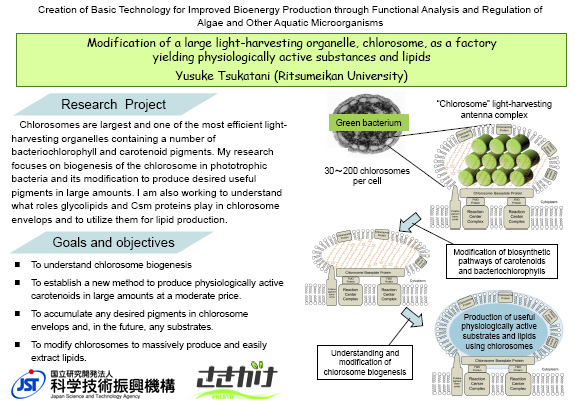PRESTO PhaseIII
Koichiro Awai

- Associate Professor, College of Science, Academic Institute, Shizuoka University
Lipid production by cyanobacterial polyketide synthases
Polyketide synthases are adopted for lipid production in the nitrogen-fixing filamentous cyanobacterium, Anabaena sp. PCC 7120. This strain is known to synthesize and accumulate very long chain fatty acid alcohol and its glycosides under nitrogen starved conditions. Taking advantage of this system, with carbon and nitrogen fixation activity, the strains which efficiently synthesize and accumulate lipids, and/or secrete lipids to outside of the cells will be established by genetic engineering approach.
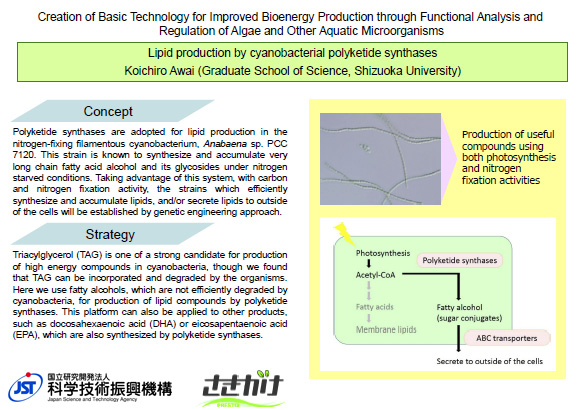
Kenji Iwahori

- PRESTO Researcher, Japan Science and Technology Agency (JST)
iPostdoctral Fellow, Graduate School of Materials Science , Nara Institute of Science and Technology)
Creation of bio-nanomaterial production system using highly functioned algae ferritins
Some ferritin proteins from algae can introduce low concentration of ferrous iron into the inner cavity (biomineralization ability). In this project, I fabricate high functionality ferritins that can work in the environment including very low concentration of metals by elucidation and improvement of the biomineralization system. The alga cell fused the ferritin can recover rare metal ions from industrial or mining wastes and it can make a contribution to a bio-remediation in soil or marine pollutions. The achievement of this project should be created the bio-nanomaterial production system for various nano-electric devises.
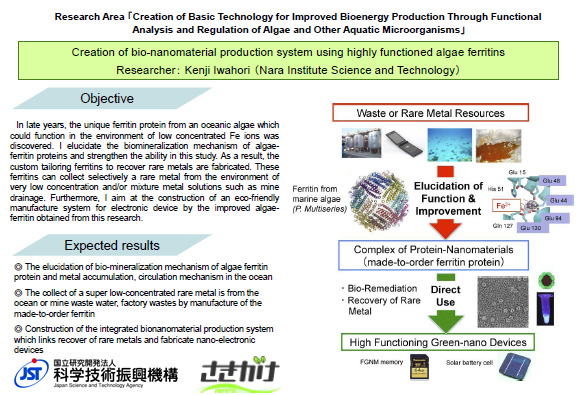
Hirotoshi Endo

- PRESTO Researcher, Japan Science and Technology Agency (JST)
iGraduate School of Agricultural and Life Sciences, The University of Tokyo, Visiting Researcher
Molecular Marine Biology Section, Atomosphere and Ocean Research Institutej
Establishment of transformation system in Pleurochrysis carterae and application for biofuel production
Coccolithophores are calcified marine unicellular algae widely distributed in the world oceans. They play a pivotal role in the global carbon cycle via absorption of a massive amount of carbon dioxide. Among these, a species Pleurochrysis carterae is regarded as a promising feedstock for biofuel production because of its high lipid content and biomass productivity. In the present study, gene manipulation techniques will be developed for the elucidation of the lipid synthesis pathway and for the production of valuable lipids.
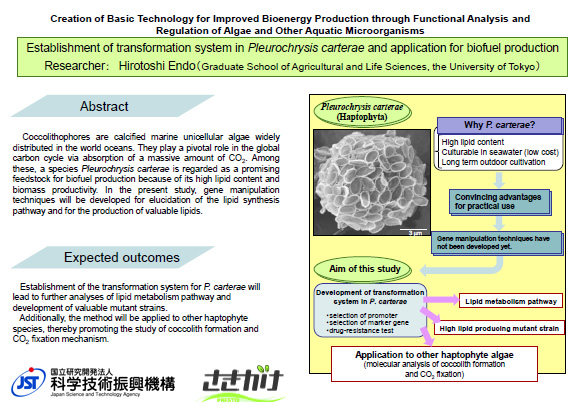
Yuichiro Kashiyama

- Associate Professor, Department of Environmental and Food Sciences, Fukui University of Technology
Development of enzyme inhibitors on the chlorophyll catabolism of herbivorous protists used for a suppression of feeding damages on algal cultures
Contamination of protozoa is one of the major obstacles in algal cultures. The Present research attempts to reveal protozoans' molecular mechanisms for detoxification catabolism of chlorophylls that photosensitize to generate highly toxic singlet oxygen. Thus, enzyme inhibitors on the chlorophyll catabolism will be developed in order to surpress activities of protozoa by phototoxicity of chlorophyll in the open-pond algal culture systems.
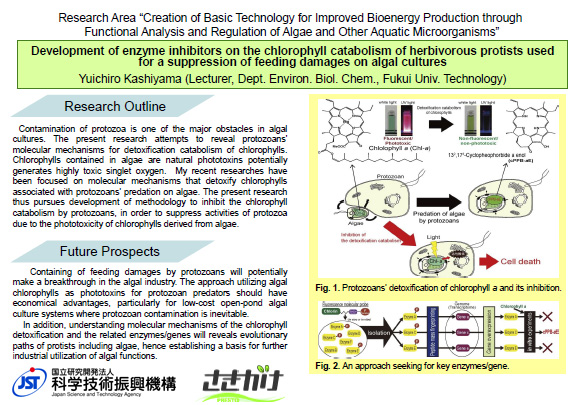
Hiroyuki Kimura
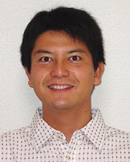
- Associate Professor, College of Science, Academic Institute, Shizuoka University
Development of a bioenergy production system associated with the accretionary prism in Southwest Japan
This study develops a bioenergy production system using the microbial community inhabiting a deep aquifer associated with an accretionary prism in Southwest Japan. In order to identify the methanogenic and hydrogen-production pathways present in the deep aquifer, meta-transcriptomic analysis of the microbial community is performed. A series of geochemical and microbiological studies of natural gas and groundwater derived from the deep aquifer is performed, and then this project identifies regions of the accretionary prism where high effective bioenergy production can be executed.
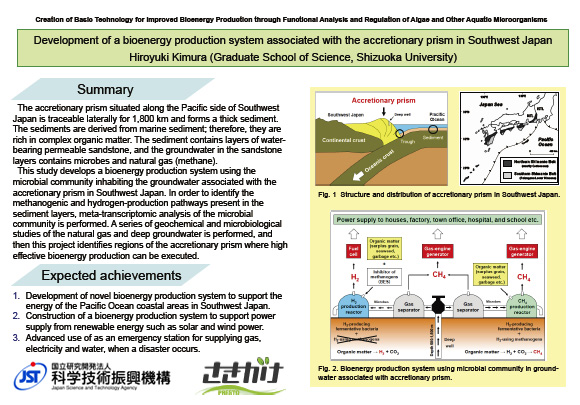
Keisuke Saito

- Lecturer, Research Center for Advanced Science and Technology, The University of Tokyo
Controlling light absorption in algae using theoretical approaches
Usually algae absorb only a narrow band in the broad spectrum of sunlight. If we can modify algae to broaden the absorption band, more effective uses of light energy are expected. This study theoretically investigates, based on protein structures, how we create a mutant that modifies the absorption band and also optimizes the energy flow between antenna proteins. Thus, I try to establish a basic technology of the light-absorption tuning and improve the efficiency of bioenergy production for any algae.
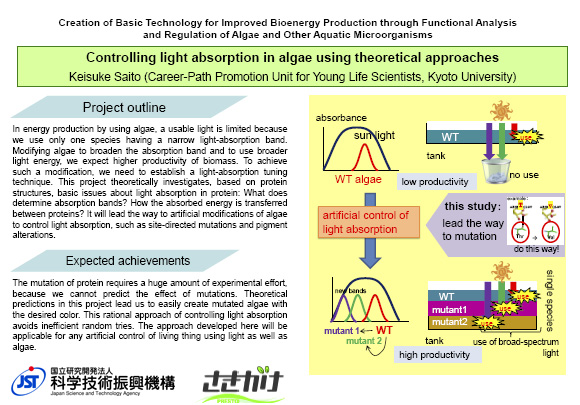
Yusuke Tsukatani

- WPI Researcher, Earth Life Science Institute, Tokyo Institute of Technology
Modification of a large light-harvesting organelle, chlorosome, as a factory yielding physiologically active substances and lipids.
Photosynthetic microorganisms thriving under low light conditions such as green sulfur bacteria have large light-harvesting complexes, chlorosomes, which are surrounded by glycolipid envelopes and contain a number of bacteriochlorophylls and carotenoids. A goal of this research project is to construct the fundamental mass-production system to use the chlorosome as a factory accumulating physiologically active carotenoids such as b-carotene. Another goal of this project is to reveal the mechanism of chlorosome biosynthesis and then develop the production system by utilizing the mechanism and modifying proteins related to chlorosome biogenesis in order to accumulate various useful substrates in chlorosomes.
